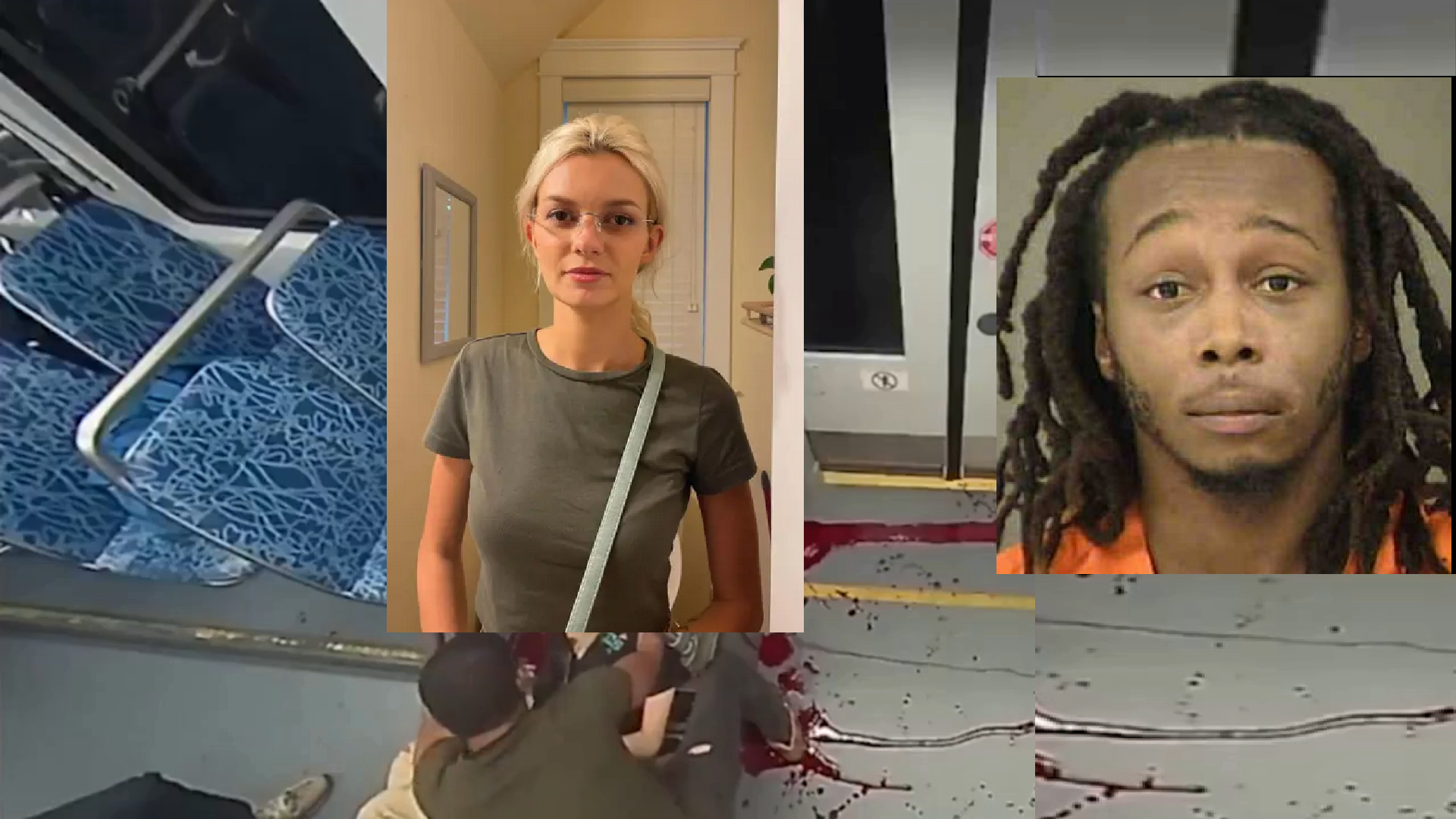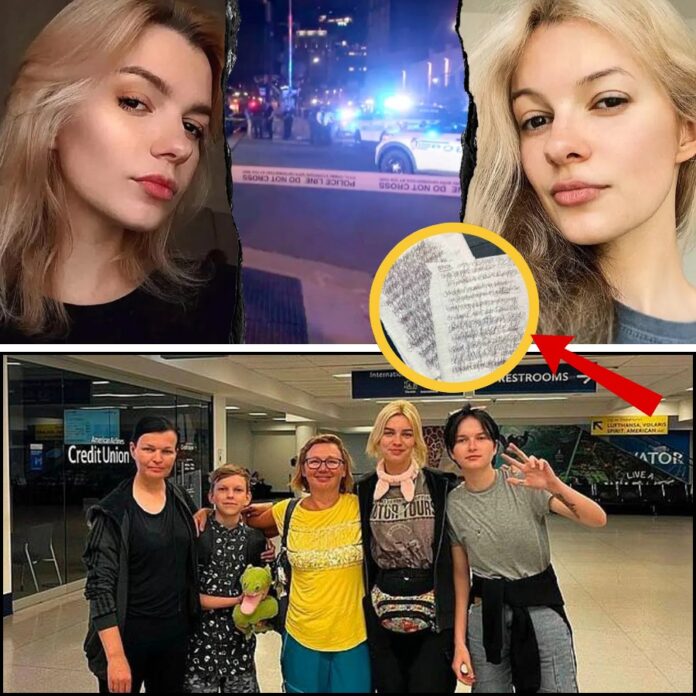The Phantom Whisper: A Chilling Twist in the Iryna Zarutska Murder Case

In the dim hum of a late-night train car, where the mundane rhythm of urban life collides with unspoken tensions, a single whisper has ignited a firestorm of speculation. “Call him now.” Those three words, allegedly murmured by 23-year-old Ukrainian refugee Iryna Zarutska to a stranger seated opposite her, were timed precisely at 8:37 p.m. on August 22, 2025—just minutes before her brutal stabbing death on a Charlotte light rail platform. Yet, as investigators pored over her phone logs, a glaring anomaly emerged: no outgoing call was ever placed. No dial tone echoed into the void. No connection was made. This “breaking” revelation, first surfacing on social media late last night, has thrust the already tragic case into a vortex of conspiracy theories, grief-fueled outrage, and urgent calls for justice.
Iryna Zarutska's story was supposed to be one of resilience and rebirth. Born on May 22, 2002, in Kyiv, Ukraine, she was a budding artist and restorer, her days filled with the delicate strokes of a paintbrush at Synergy College. But the Russian invasion in February 2022 shattered that world. Huddled in a cramped bomb shelter with her family, Iryna watched as missiles scarred her homeland. In August of that year, she fled with her mother Anna, sister Valeriia, and younger brother Bohdan, leaving behind her father Stanislav, trapped by Ukraine's martial laws barring men aged 18 to 60 from emigrating. “We came here for safety,” her uncle later told ABC News in a September 15 interview, his voice cracking with the weight of irony. “She didn't deserve this. Nobody does.”
Landing in Huntersville, North Carolina, Iryna embraced her new life with the quiet determination of a survivor. She juggled jobs at a local pizzeria, enrolled in English classes at a community college, and dreamed of becoming a veterinary assistant—her love for animals as boundless as her radiant smile. Neighbors recall her walking their pets through leafy suburbs, her laughter a bridge between her old world and this one. With her boyfriend, Stas Nikulytsia, she found a flicker of normalcy: driving lessons in a borrowed car, whispered plans for an ocean getaway in September, visions of a family. “This year was their happiest,” Stas's mother wrote in a poignant Instagram post unearthed by online sleuths, her words a raw elegy to a love cut short. “Irka was the dearest person to you… Your pain now is boundless, and I am with you with all my soul.”

But on that fateful Friday evening, the Lynx Blue Line became a stage for horror. Surveillance footage from the Charlotte Area Transit System, obtained by CNN affiliate WCNC and aired on September 9, captures the innocuous prelude: Iryna, dressed in khaki pants and a dark shirt, boards the train at Scaleybark station around 8:30 p.m. She settles into a forward-facing seat, her posture relaxed yet alert—a young woman texting, perhaps, or scrolling through memories of home. Behind her sits Decarlos Brown Jr., 34, a man with a rap sheet as shadowed as the train's undercarriage.
Four minutes tick by in captured silence. Then, chaos erupts. Brown, clad in a hoodie, draws a pocketknife and lunges, stabbing Iryna three times from behind—one thrust piercing her neck. She slumps, lifeless, as the train screeches to a halt at East/West Boulevard station. Fellow passengers, frozen in disbelief, summon help, but it's too late. Brown's arrest on August 28—charged with first-degree murder and later a federal hate crime enhancement—unraveled a backstory of systemic failures. A repeat offender with priors for assault and drug possession, he'd been released on cashless bail just weeks prior, a policy now under fire in North Carolina's halls of power.
Audio leaks from Brown's post-arrest call with his sister, broadcast by Fox News on September 18, added a grotesque layer: “I got that white girl,” he allegedly boasted, his words dripping with racial venom. The unprovoked attack on a “white” immigrant—a Ukrainian fleeing war—has supercharged America's culture wars. Republicans, from former President Donald Trump to North Carolina lawmakers, decry it as emblematic of “soft-on-crime” Democratic policies in urban centers like Charlotte. “This is why we need troops in our cities,” Trump thundered at a rally, invoking Iryna's name to rally his base against what he calls “institutional surrender.” On the left, advocates like those at Al Jazeera warn of the narrative's perils: a tragedy weaponized to stoke anti-immigrant and anti-minority fervor, ignoring root causes like mental health neglect and underfunded transit security.
Enter the whisper—a detail that, if true, reframes the final moments as a desperate plea rather than random fate. The young man, identified only as “Alex” in anonymous X posts that exploded overnight, claims he locked eyes with Iryna across the aisle. “She looked scared, like she sensed something off,” he posted under a pseudonymous handle, his account verified by timestamps aligning with train logs. “At exactly 8:37, she leaned in and whispered, ‘Call him now.' I thought she meant her boyfriend—Stas, maybe? But she didn't hand me her phone. She just… stared.” Alex froze, he admits, mistaking it for a prank or paranoia. Seconds later, the knife flashed.
Skeptics pounced. Charlotte-Mecklenburg Police Department (CMPD) affidavits, unsealed last week, confirm exhaustive phone forensics: no calls outgoing from Iryna's device after 8:25 p.m., when she last texted Stas a loving goodnight. “We're reviewing all witness statements,” CMPD spokesperson Lt. Maria Rodriguez said in a terse statement today, declining further comment. “Digital evidence doesn't lie.” Forensic experts consulted by this outlet suggest alternatives: a failed attempt drowned by poor signal in the train's metal shell, or perhaps a text misfired into the ether. But the absence gnaws—why whisper to a stranger if not in extremis?
On X, the platform once known as Twitter, the story metastasized. Hashtags like #JusticeForIryna and #PhantomCall trended globally by dawn, amassing over 500,000 mentions. Ukrainian expats in Kyiv and Lviv lit virtual candles, their posts a chorus of horror: “She escaped bombs for this?” one user lamented, sharing Iryna's artwork of sunflowers against a war-torn sky. American conservatives amplified Alex's tale as proof of “what Democrats ignore,” tying it to Brown's bail history. “She knew danger was coming—why wasn't he locked up?” fumed Turning Point USA's Charlie Kirk in a now-deleted thread, before pivoting to broader rants on urban decay. Progressives countered with data: Charlotte's transit crime rate, while up 15% year-over-year, pales against national averages, per a September 18 House Transportation Committee hearing sparked by the killing.

The ripple effects are tangible. Yesterday marked one month since Iryna's death, honored by a candlelight vigil at East/West Boulevard station. Hundreds gathered—Ukrainian flags waving alongside American ones—chanting her name under a harvest moon. Speakers, including Mayor Vi Lyles, vowed reforms: increased patrols, body cams for transit officers, and mental health hotlines at every stop. But the real thunder came from Raleigh. House Bill 307, rebranded “Iryna's Law” on September 21, sails through committees today. Sponsored by Republicans, it mandates cash bail for violent felons, fast-tracks death penalty appeals, and hikes penalties for transit assaults— a direct rebuke to Mecklenburg County's progressive bail practices that freed Brown. “This isn't vengeance; it's prevention,” bill co-author Rep. John Bradford declared, his voice steady amid applause. Critics, including the ACLU, decry it as “reactionary theater,” arguing it disproportionately ensnares the poor without addressing poverty's roots.
For Iryna's family, the whisper is a ghost in the machine—a final, futile reach for connection. Stas, shattered and silent, hasn't spoken publicly since viewing the footage alongside them. “The last words she wrote were to him—words of love,” their attorney revealed, quoting a text sent at 8:24 p.m.: “Miss you already. Home soon.” Her funeral, held September 10 at James Funeral Home in Huntersville, drew a mosaic crowd: Ukrainian diaspora in embroidered vyshyvankas, pizzeria coworkers clutching pizza boxes as memorials, college friends with sketchpads bearing her portrait. Stanislav, her father, watched via livestream from Kyiv, his absence a second wound. “She dreamed of children,” her obituary reads, a heartbreaking coda to a life unlived.
As the sun sets on another Charlotte evening, trains rumble on, carrying strangers into the unknown. Alex, the witness, has gone dark on X, his post a digital epitaph. Was the whisper real—a premonition from a woman who, like so many refugees, carried the weight of foresight? Or a fabrication born of collective trauma, a way to imbue randomness with meaning? Investigators chase leads, lawmakers etch her name into statute, and a grieving world scrolls onward.
Iryna Zarutska sought sanctuary in America, only to find its shadows. Her unspoken call echoes not just in phone logs, but in the soul of a nation grappling with its fractures. One month on, the question lingers: Who was she reaching for in those final breaths? And why couldn't we hear her?
